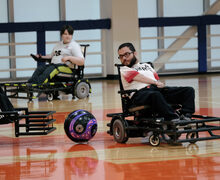Students with disabilities are still facing obstacles in online classes
Emily Steinberger | Photo Editor
Senior Eli Blodgett is taking almost all of their classes online this semester.
The Daily Orange is a nonprofit newsroom that receives no funding from Syracuse University. Consider donating today to support our mission.
Halfway through the fall semester, some Syracuse University students with disabilities are still facing challenges taking online classes and accessing course accommodations.
While the coronavirus pandemic has created its own set of complications for students with disabilities, it has also brought to the foreground accessibility issues at SU that predate the health crisis, students said.
Disability services and staff have made adjustments to better serve both students who are taking classes remotely and those coming to campus for in-person classes. But some students said they have faced pushback when they asked for accommodations.
Eli Blodgett, a senior stage management and theatrical design major, is taking almost all of their classes online this semester. Blodgett has received support from the Center for Disability Services and the Disability Cultural Center, but some individual professors are slow to provide accommodations, they said.
“The way that professors are handling learning in a virtual environment actually creates more inequity, which means that disabled students automatically get left behind,” Blodgett said.
While professors Blodgett had built relationships with before classes shifted online in March have found ways to accommodate their physical and neurological disabilities, others have been reluctant, they said.
“When I was in class with them, I felt like they could at least see that I was engaged in class, but now that’s not a factor,” Blodgett said. “People with disabilities want to be active learners. That’s why they’re asking for accommodations — not the opposite.”
The way that professors are handling learning in a virtual environment actually creates more inequity, which means that disabled students automatically get left behind.Eli Blodgett, SU senior
Judy Kopp, assistant director of the Center for Disability Services, said professors have overwhelmingly been sensitive to students’ needs amid the pandemic. The office is still providing instructors with support and has also adjusted its counseling and tutoring programs to help students with disabilities while complying with public health guidelines, she said.
CDR staff are meeting with students almost exclusively online but have also met outside with students who feel burned out after virtual learning, Kopp said. The shift to online classes has also broadened the office’s knowledge about online accessibility measures, such as audio captioning tools, that work best for students, she said.
Kopp said the office is seeing its normal number of students, even after fall enrollment dropped by more than 1,500 students.
Stephanie Hilliard, a doctoral student in the composition and cultural rhetoric program, has adjusted course guidelines in the writing class they teach so students with disabilities aren’t overloaded, they said.
Hilliard has eliminated penalties for late assignments in the class, which is taught asynchronously. Students can choose whether they would like to receive written feedback on assignments or schedule a virtual conference instead.
“There’s a lot of wiggle room to just not be OK in my class,” Hilliard said. “That’s important because we don’t always know what’s going on with our students — we don’t always recognize how much work they’re doing or what kind of stress they’re under.”
Hilliard, who has anxiety, depression and attention deficit hyperactivity disorder, said instructors should proactively think of ways to make their courses accessible –– not just respond to specific accommodations.
Rowan Oliver, who studies film, decided in August to take the year off due to concerns about managing their disabilities.
“It was a really, really difficult decision for me to not go back to school,” Oliver said. “It takes a lot of willpower and a lot of determination, and it’s not that I don’t have that, it’s just that my disabilities make it harder to mentally deal with that.”
Oliver said they’ve faced pushback from professors when requesting accommodations in the past and weren’t sure they would be able to manage that stress this semester. They plan to return to SU in the future.
The steady rate of students accessing CDR services amid decreased enrollment could be an indication that registrations with the office are up, but it’s not certain, Kopp said. The pandemic has drawn attention to anxiety about school and other conditions students might not have otherwise realized they experience.
Students that may not have identified as having a disability may now recognize that they have trouble in particular areas.Judy Kopp, assistant director of the Center for Disability Services
“Students that may not have identified as having a disability may now recognize that they have trouble in particular areas,” Kopp said.
Courses at SU this year have relied more heavily on weekly assignments than normal and spanned a variety of online streaming and testing platforms, Kopp said, which can be a challenge for students with certain mental health challenges.
“When you look at the expectations for one class and how different they are from the expectations for the other four classes the student is taking, it creates a little chaos, and that can be really challenging for all students but particularly with students with disabilities,” Kopp said.
Brianna Shults, the internship and employment coordinator for InclusiveU and the Taishoff Center, said students in the InclusiveU program have struggled most with the social and mental health obstacles the semester has presented. InclusiveU provides individualized academic support for students with disabilities at SU.
The program’s peer trainers have worked to find opportunities to engage with students on campus, even with social distancing guidelines in effect. Mentors have also received broader access to Blackboard so they can view students’ assignments and help facilitate discussions with classmates online, she said.
“Socially, our students love to be together, so that has definitely been a challenge for many of them,” Shults said.
Blodgett said they appreciate the work some SU staff have done to make the unusual semester feasible for students with disabilities. At the same time, they wish the university could embrace a culture that would center accessibility and make it easier for professors to provide accommodations.
“Accommodations are work — that’s why we have multiple offices on this campus that are doing that work,” Blodgett said. “But the university system in general is not set up to accommodate — they’re set up to restrict, and that puts professors in a place where they have to be harder than maybe they want to be.”
All professors have an obligation to provide accommodations to students with disabilities, Hilliard said. Professors should respond to accommodations requests with empathy and compassion, even if they’re not familiar with a specific disability or aren’t sure how to accommodate it, they said.
Professors and university staff should be working with students and developing relationships, they said.
“Be human with each other,” Hilliard said. “We can stumble through this together or we can be angry at each other and stumble through it alone.”
Published on October 14, 2020 at 11:55 pm
Contact Michael: [email protected] | @MichaelSessa3





